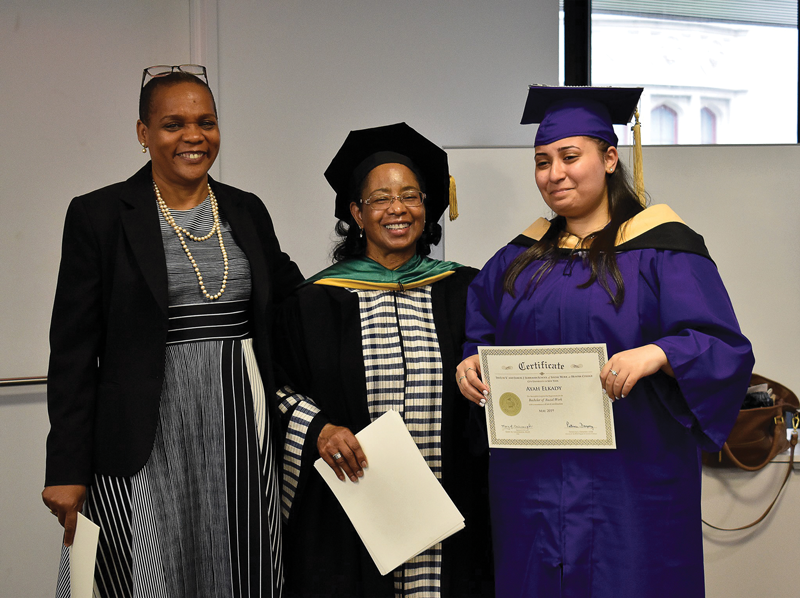
They’re a secret weapon in plain sight: social workers. Embedded in an array of critical fields, from healthcare to law to education, social workers are an overlooked and underused resource—even as the fields around them strain to meet escalating demands.
The Trust has a long history of lifting up social work thanks to several donors who have left permanent gifts for the field. These funds make The Trust one of the largest foundation social work funders in the country.
Last year, The Trust worked with a consultant and convened an advisory committee to identify the best use of our social work funds. This resulted in a new strategy that strives to strengthen the field locally and nationally, while creating pilots at community organizations to demonstrate the benefits that come from a deeper integration of social workers in healthcare, anti-poverty work, and other fields.
Who are social workers?
According to the federal Bureau of Labor Statistics, there are more than 715,000 social workers nationally. Their accreditation, education, ages, and backgrounds vary widely, but they have several commonalities.
“Social workers are just really, really eager to change the world and enhance the quality of life for everybody around them,” said Kathryn Haslanger, chief executive officer of the Jewish Association Serving the Aged (JASA). “I think they often have a commitment to social justice, a concern for people who are on the edge and may not have had a lot of choices.”
Healthcare integration
“Many people in healthcare who work with a social worker know they could never work without that social worker,” said Robyn Golden, who directs the Trust-supported Center for Health and Social Care Integration at the Rush University Medical Center, and leads its Coalition for Social Work and Health. The Coalition is an alliance of educators, researchers, and policy leaders who are advocating across the nation to better embed social workers into the daily functions of the healthcare field.
“We’re in a crisis in healthcare in this country,” said Golden. During and after the COVID-19 pandemic, the industry was hit with a surge in demand for its services at the same time many workers were leaving the field. Compounding existing inequities, the service gaps disproportionately affected low-income communities of color, where the Coalition has focused its efforts.
“While social workers are the largest providers of mental health care, they play a critical role in other aspects of health,” said Golden. “Social workers help patients navigate our complex medical system and help address the social determinants of health. Unfortunately, they have gotten overlooked as general healthcare providers.” She said the campaign would highlight how social workers in healthcare settings can reduce unnecessary re-hospitalizations and other medical costs, while also improving the care experience for patients, families, and healthcare providers themselves.
“Social workers view patients as people, not just as their disease,” said Golden. “They take the time to get to know who they are, what they want and need, what matters to them right now. And they work with family caregivers, who are often left out of the equation. This tailored approach is what it’s going to take to get each person the best outcome possible and minimize inequitable outcomes.”
Golden noted insurance carriers often won’t pay for social workers in medical settings, so their role is often overlooked or eliminated by cost-cutters focused on the bottom line.
The Center’s campaign hopes to change that. It seeks to elevate the stature of social workers–and convince insurers and healthcare systems of the wisdom of including, and paying for, their valuable services.
The Coalition is following in the footsteps of a 2019 National Academy of Sciences report on social care and the nation’s health, funded in part by The Trust. The report laid out the case that people’s health was directly affected by social factors such as housing, transportation, and food, and that social workers could address those needs. The report’s conclusion was that the country should widen its lens and incorporate social factors into healthcare. To move toward that goal, the report recommended bringing more trained social workers into the system, and including their services in reimbursement assessments.
Academic-community partnerships
As part of The Trust’s new social work funding strategy, it made grants that forged partnerships between academic institutions and community-based service providers. The goal is to create a new generation of social workers with hands-on experience while demonstrating how they can help nonprofits increase their impact with underserved groups, such as older adults.
“Even before the pandemic, there were long-standing workforce challenges in the field of aging,” said Haslanger of JASA.
A Trust grant will create a pilot in which Lehman College Department of Social Work graduate students take classes while conducting their field work at JASA facilities. They will assist older adults whose challenges are complicated by factors such as lack of stable housing, former incarceration, mental illness, or substance abuse.
Molly Krakowski, JASA senior director of government affairs, said the students will expand the reach of staff to “support and provide individuals with one-on-one counseling, run support groups, and develop community connections. Students bring a lot of passion to the table while they’re learning, and JASA is excited to be part of their professional journey.”
The program will document the work, and the results, if positive, will be used to advocate with policymakers, funders, and researchers, to replicate it. Haslanger added that JASA hopes that the students become employees at the agency after they graduate. “We hope they fall in love with us,” she said.
Creative solutions

Another Trust-funded pilot teams an academic institution with a community service provider to use social workers to treat homeless shelter residents who have experienced trauma. Social work students from Adelphi University will learn to work with people at Brooklyn facilities operated by CAMBA, while being trained by staff from both organizations. If the pilot succeeds, it will be expanded to CAMBA’s other locations and introduced to other shelter operators.
The Bronx Defenders, which gives free legal assistance to indigent defendants, will expand a successful model of using social workers in the legal field. The group created a holistic defense model using lawyers, paralegals, and social workers to address legal matters as well as social service issues, such as housing or healthcare, which can greatly complicate a defendant’s life and their ability to navigate the legal process. The Bronx Defenders will send teams led by social workers to train other nonprofits across the country on this model, which was found to reduce the rate and length of defendants’ incarceration and save $165 million in tax dollars.
On Long Island, Herstory Writers Workshop has been lifting up the voices, through written stories, of people often not heard by the larger community. The group will work in the Wyandanch school district, teaming up with Adelphi School of Social Work master’s program students to use narrative techniques to elicit the stories of students and parents, 87 percent of whom are Black and Latinx.
They believed in the power of social work
Much of The Trust’s investment in social work is made possible by the Lois & Samuel J. Silberman Grant Fund. The Fund was created by the late “Buddy” Silberman, CEO of the Consolidated Cigar Corp., which made Dutch Masters and Muriel cigars. Buddy, who was deeply affected by the deprivations of the Great Depression witnessed as a child, was once characterized by his daughter Jayne who became a social worker—as a “businessman with the heart of a social worker.”
A highlight of The Trust’s work with the Fund was the development of Hunter College’s East Harlem campus for its Silberman School of Social Work. The Fund also enabled the school to triple its enrollment, begin a doctorate program, and finance research projects.
The future of the field
The political activist Gloria Steinem once said: “Social workers are my collective heroes. They sit at the juncture between those with too much power and those with not enough.” The Trust will keep funding projects to advance social work education, practice, and policy. This will let social workers continue to provide the compassionate and supportive services people need and grow the field for the future.
Three ways you can support the field of social work:
- Be an influencer! Share this story with friends and family and talk about it.
- Donate directly or through your donor-advised fund to any of the nonprofits found in this story, or others like them.
- Leave a legacy by establishing a permanent fund. If you would like to discuss how to design a philanthropic legacy, contact giving@nyct-cfi.org.